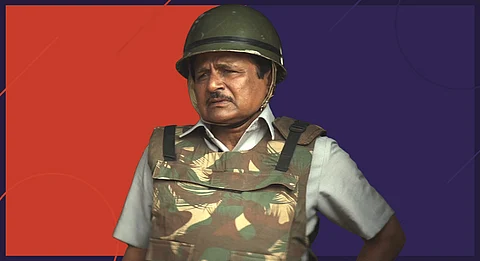
- Reviews
- Power List 2024
- Cannes 2024
- In-Depth Stories
- Web Stories
- News
- FC Lists
- Interviews
- Features
- FC SpecialsFC Specials

In this weekly series, Rahul Desai lists 50 of Hindi cinema's favourite "third wheels" – that is, memorable characters whose roles are little more than fleeting cameos and little less than supporting turns – since 1990. There will be no particular order: just a colourful recollection of emblematic faces who've left us craving for more.
After Peepli Live in 2010, one of India's finest actors, Raghubir Yadav, was in danger of drifting into C-grade oblivion after starring in unmentionables like Gandhi To Hitler and Mainu Ek Ladki Chahiye. In the former, his role as the German dictator exchanging letters with Mahatma Gandhi was as misguided as the kitschy film, while in the latter, he played a 'comical' lawyer who defends a rapist by behaving like a lecherous old uncle to prove his point. Long fading was his reputation as the only Indian actor to have been in no less than seven Oscar-submitted movies.
And then came Newton, followed by Love Per Square Foot. In the Mumbai-centric latter, he shines as the father-of-hero character: an endearing railway announcer on the verge of retirement after 30 years of loyal service at Dadar station. But it's in the former – Amit Masurkar's powerful, poignant and earthy political satire – that Raghubir Yadav showcases a lifetime of untapped potential. It became his eighth Oscar-submitted movie.
Amidst scene-stealers like Rajkummar Rao, Pankaj Tripathi, Anjali Patil and Sanjay Mishra, Yadav's presence is integral to the film's pursuit of procedural mundaneness and its wry depiction of "autopilot" seniority. Yadav plays an old-school election clerk, Loknath, whose job is to work under the young idealism of rookie officer Newton (Rao) to device a fair polling system at an obscure village in the Naxal-infested jungles of Chattisgarh. Loknath is one of three weathered male veterans – the others being Security chief Aatma Singh (Tripathi) and fleeting election instructor (Mishra) – in the orbit of Newton Kumar.
Loknath, too, is a cynical veteran who just wants to do his work and go home. But while all three get frustrated with Newton's righteousness at separate points, what makes Loknath different from the other two is his outgoing personality and his unwillingness to embrace sarcasm as a defense mechanism. Thanks to his unfulfilled writing ambitions – he also hints that he has been a bachelor all his life – he is a little more naïve than the rest. Loknath, in Yadav's deft hands, then becomes the sort of good-natured uncle who would rather keep everyone entertained than endure the pointlessness of his profession.
At some level, given that he has perhaps lived alone for so long, he enjoys human company and aspires to make conversation with anyone around him. His health conditions – diabetes, asthma, high blood pressure – can also be construed as cranky attention-seeking conditions, the kind neglected parents embrace when they want their children to visit. Aatma Singh, too, enjoys his presence (he even lightly acknowledges him as a "gyaani") because he sees in him another tired servant of a system that thrives on putting the 'demo' in democracy. As expected, his anecdotes are colourful – his failed attempts at a love marriage, an unimaginative zombie ("jombie" in his words) story he is writing, and his efforts to 'lighten' up Newton's mood with a frivolous card-astrology trick.
There's something about Yadav's face – it is both tender and tragic – that urges the more perceptive filmmakers to cast him as a worldly wise, yet compromised, everyman. Someone with hidden regrets about having to survive rather than live. Even in Anand Tiwari's Love Per Square Foot, he is an accidental railway announcer – a failed singer who, once again, settled for the security of a government job over the volatility of his childhood passion.
Newton sees in him this ex-rebel wariness: an outsider who has lost the passion to continue challenging the status quo – evident from his passive, relaxed attitude at the tolling booth. Which is why Newton loses his patience with Loknath quite often – it is disappointment, mostly, that he might turn into this jocular old fart if he continues to defy the rules of society. If Newton had humoured the man and turned over his future card, he might have well seen a photograph of Loknath.
The only time Loknath loses his cool – his indulgent exterior – is after the media circus, when Newton cannot fathom the deeply rooted injustice of their setting. He is irritated with the boy's honesty. "I have been seeing your netagiri since morning," Loknath remarks, perhaps not realizing the irony of attaching a ministerial term to Newton's anti-establishment feelings.